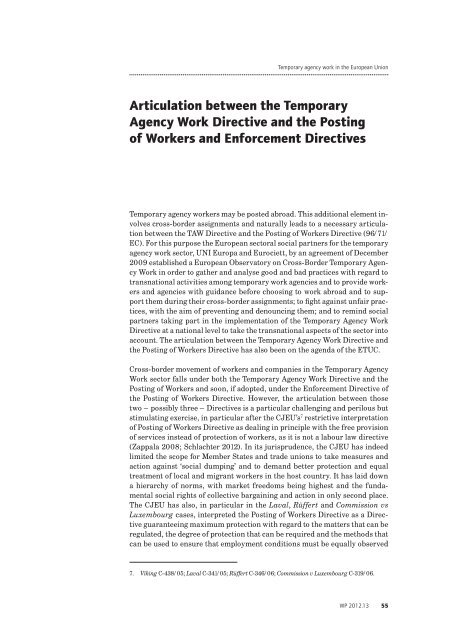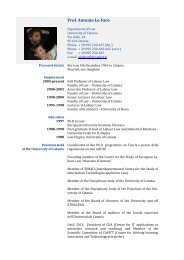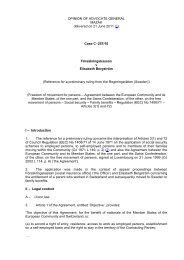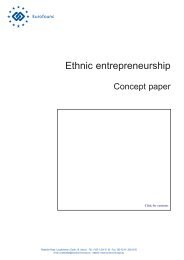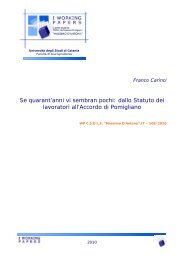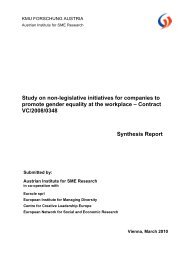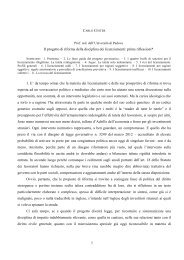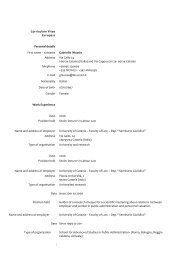Full text - European Trade Union Institute (ETUI)
Full text - European Trade Union Institute (ETUI)
Full text - European Trade Union Institute (ETUI)
You also want an ePaper? Increase the reach of your titles
YUMPU automatically turns print PDFs into web optimized ePapers that Google loves.
Temporary agency work in the <strong>European</strong> <strong>Union</strong><br />
Articulation between the Temporary<br />
Agency Work Directive and the Posting<br />
of Workers and Enforcement Directives<br />
Temporary agency workers may be posted abroad. This additional element involves<br />
cross-border assignments and naturally leads to a necessary articulation<br />
between the TAW Directive and the Posting of Workers Directive (96/71/<br />
EC). For this purpose the <strong>European</strong> sectoral social partners for the temporary<br />
agency work sector, UNI Europa and Eurociett, by an agreement of December<br />
2009 established a <strong>European</strong> Observatory on Cross-Border Temporary Agency<br />
Work in order to gather and analyse good and bad practices with regard to<br />
transnational activities among temporary work agencies and to provide workers<br />
and agencies with guidance before choosing to work abroad and to support<br />
them during their cross-border assignments; to fight against unfair practices,<br />
with the aim of preventing and denouncing them; and to remind social<br />
partners taking part in the implementation of the Temporary Agency Work<br />
Directive at a national level to take the transnational aspects of the sector into<br />
account. The articulation between the Temporary Agency Work Directive and<br />
the Posting of Workers Directive has also been on the agenda of the ETUC.<br />
Cross-border movement of workers and companies in the Temporary Agency<br />
Work sector falls under both the Temporary Agency Work Directive and the<br />
Posting of Workers and soon, if adopted, under the Enforcement Directive of<br />
the Posting of Workers Directive. However, the articulation between those<br />
two – possibly three – Directives is a particular challenging and perilous but<br />
stimulating exercise, in particular after the CJEU’s 7 restrictive interpretation<br />
of Posting of Workers Directive as dealing in principle with the free provision<br />
of services instead of protection of workers, as it is not a labour law directive<br />
(Zappala 2008; Schlachter 2012). In its jurisprudence, the CJEU has indeed<br />
limited the scope for Member States and trade unions to take measures and<br />
action against ‘social dumping’ and to demand better protection and equal<br />
treatment of local and migrant workers in the host country. It has laid down<br />
a hierarchy of norms, with market freedoms being highest and the fundamental<br />
social rights of collective bargaining and action in only second place.<br />
The CJEU has also, in particular in the Laval, Rüffert and Commission vs<br />
Luxembourg cases, interpreted the Posting of Workers Directive as a Directive<br />
guaranteeing maximum protection with regard to the matters that can be<br />
regulated, the degree of protection that can be required and the methods that<br />
can be used to ensure that employment conditions must be equally observed<br />
7. Viking C-438/05; Laval C-341/05; Rüffert C-346/06; Commission v Luxembourg C-319/06.<br />
WP 2012.13 55


